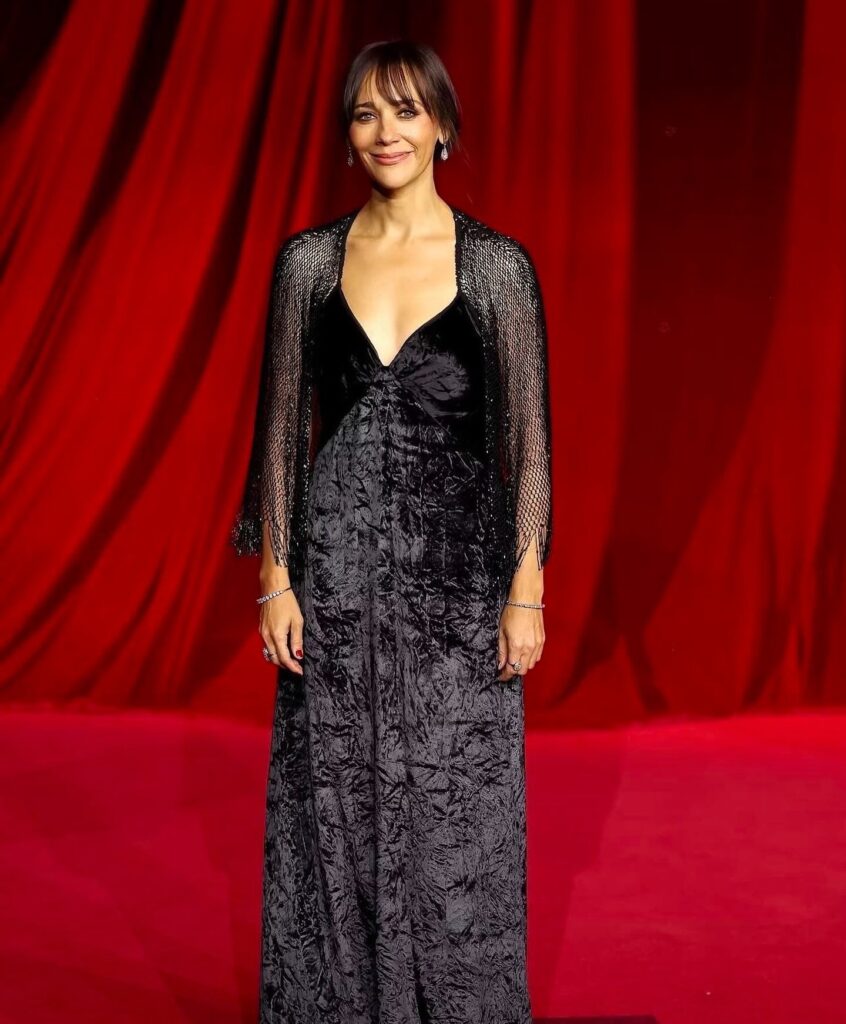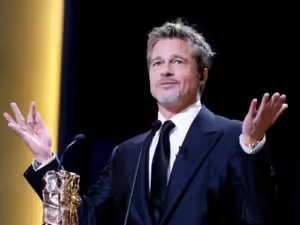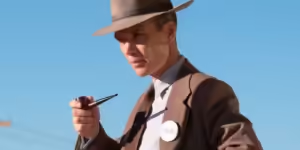
Rashida Jones recently accepted an honorary Oscar on behalf of her late father, the legendary music producer Quincy Jones.
This poignant moment took place just two weeks after Quincy passed away on November 3.
Rashida, along with three of her siblings, made a heartfelt appearance at the Governors Awards in Los Angeles on November 17.
They gathered to honor their father’s remarkable contributions to film music.
Quincy Jones is celebrated for scoring iconic films such as The Italian Job, The Wiz, and The Color Purple.
A Family Tribute
Rashida expressed the deep emotional weight of the occasion.
She revealed that Quincy had been preparing a speech for the event.
“Really, really, really intended on being here with us,” she shared, highlighting her father’s commitment to his work and family.
“Our father passed away two weeks ago today,” Rashida said, addressing the audience.
She noted that four of the seven Jones children were present to celebrate their father’s legacy.
Rashida emphasized the importance of family and the connections Quincy made throughout his life.
“He had this natural gift with people,” she remarked.
Celebrating a Legacy
Rashida continued to honor her father’s impact on music and culture.
She stated, “His music has literally defined an entire century of culture.”
From jazz to disco, film to pop, Quincy’s contributions span a wide range of genres.
Rashida pointed out that the real thread in his music was love.
She conveyed how Quincy infused love into every note he composed.
Reading Quincy’s Words
During the ceremony, Rashida read a few words that Quincy had written before his passing.
He reflected on his journey as a film composer, noting the lack of representation for people of color in the industry.
Quincy expressed pride in being part of the evolution of music and film.
He highlighted collaborations with notable directors like Sydney Pollack and Steven Spielberg as career milestones.
Rashida encouraged the audience to explore Quincy’s extensive music catalog.
“There’s an entire universe waiting in his seven decades of music,” she said.
A Personal Message
Rashida shared a personal message from her father.
He often advised, “Live every day like it’s your last and one day you’ll be right.”
This quote encapsulates Quincy’s zest for life and his philosophy on living fully.
Quincy Jones’ Final Days
Quincy Jones passed away at his home in the Bel Air area of Los Angeles.
His publicist confirmed the news, stating that he had been battling pancreatic cancer.
Reports indicated that there were no other contributing factors to his death.
Before his passing, Quincy did not publicly disclose his cancer diagnosis.
He was laid to rest in a private funeral ceremony held in Los Angeles a week after his death.
Rashida’s Emotional Journey
Rashida’s journey to the stage was filled with mixed emotions.
While it was a difficult decision for the family to attend the awards, they felt it was essential to celebrate Quincy’s life and achievements.
The event served as a reminder of the impact Quincy had on the music industry and on those who knew him.
Rashida’s heartfelt tribute resonated with many in attendance, showcasing the love and admiration they had for their father.
The Impact of Quincy Jones
Quincy Jones was not just a music producer; he was a cultural icon.
His work has influenced countless artists and genres over the decades.
Rashida’s acceptance of the honorary Oscar highlights the importance of recognizing contributions to the arts.
It also serves as a reminder of the personal stories behind public achievements.
Quincy Jones: A Legendary Contributor to Music
Quincy Jones is a name that resonates across the music industry.
He is known not only as a music producer but also as a composer, conductor, and arranger.
From jazz to pop, his contributions have significantly shaped the landscape of music over the past several decades.
Early Life and Start in Music
Quincy Jones was born on March 14, 1933, in Chicago, Illinois.
His early exposure to music came from his mother, who was a classically trained musician.
Quincy picked up the trumpet as a child and excelled in music from a young age.
He attended Seattle’s Garfield High School, where he studied music and began arranging for bands.
After high school, Quincy moved to New York City and quickly made a name for himself in the jazz scene.
Contributions to Jazz
One of Quincy Jones’ earliest contributions to music was in the jazz genre.
He worked with many well-known jazz musicians, including Count Basie and Duke Ellington.
His arranging skills set him apart, and his ability to blend different styles became evident.
In the 1950s, he released his debut album titled This Is How I Feel About Jazz.
The album showcased his innovative style and set the stage for his future work.
Film Scoring and Soundtracks
Aside from jazz, Quincy Jones made significant strides in film scoring.
He composed music for numerous films, bringing his unique touch to the soundtrack world.
Quincy scored films such as The Italian Job, The Color Purple, and In the Heat of the Night.
His work on The Color Purple earned him multiple Academy Award nominations.
Through film scoring, Quincy brought emotions to life, enhancing storytelling through music.
Collaborating with Michael Jackson
One of Quincy Jones’ most notable partnerships was with pop icon Michael Jackson.
Their collaboration produced some of the most successful albums in music history.
Together, they created Off the Wall, Thriller, and Bad, which defined the sound of the 1980s.
Thriller remains the best-selling album of all time, showcasing Quincy’s production genius.
His innovative use of sounds, instruments, and arrangements transformed pop music forever.
Contributions to R&B and Soul
Quincy Jones did not limit himself to jazz and pop; he also deeply influenced R&B and soul music.
His production skills helped artists like Aretha Franklin and Ray Charles reach new heights.
He infused R&B with orchestral elements, giving it more depth and richness.
Songs like “Ain’t No Way” and “What’s Goin’ On” feature his masterful arrangements.
Quincy’s work in this genre earned him numerous awards and accolades over the years.
Innovations in Music Production
Quincy Jones is also credited for revolutionizing music production techniques.
He was one of the first producers to blend various genres seamlessly.
His ability to combine orchestration with modern sounds changed how music was produced.
Quincy embraced new technology and was among the first to use digital recording techniques.
This forward-thinking attitude helped many artists make their mark in the industry.
Philanthropy and Advocacy
Beyond his musical contributions, Quincy Jones has been an advocate for social change.
He has worked tirelessly to support young musicians and promote music education.
Quincy founded the Quincy Jones Musiq Consortium, which provides resources for aspiring artists.
His dedication to philanthropy highlights the importance of music in developing communities.
Quincy believes in using music as a tool for empowerment and cultural exchange.
Awards and Recognitions
Quincy Jones’ contributions have not gone unnoticed.
He has received multiple Grammy Awards throughout his career, totaling over 28 wins.
In 1991, he became the first black man to receive the Grammy Lifetime Achievement Award.
He was also awarded the Kennedy Center Honors for his lifetime achievements in the arts.
These recognitions solidify his legacy as a music industry giant.
Influence on Future Generations
Quincy Jones has opened doors for countless artists.
His work has inspired new generations of musicians to push boundaries and explore different genres.
Many contemporary artists cite him as a major influence in their careers.
Quincy’s ability to adapt and innovate in a constantly changing industry is a lesson for all.
His impact extends beyond his own work, influencing the path of music itself.
Quincy Jones: Celebrating His Most Famous Collaborations
Quincy Jones is one of the most influential figures in music history.
His work spans across genres, and he is known for collaborating with some of the biggest names in the industry.
From jazz to pop to film scoring, Quincy’s collaborations have left a lasting impact on music.
Let’s dive into some of his most famous partnerships that shaped the sound of an entire generation.
Quincy and Michael Jackson
One of the most iconic collaborations in music history is between Quincy Jones and Michael Jackson.
Their partnership began in the late 1970s with the album Off the Wall.
This album featured hits like “Don’t Stop ’Til You Get Enough” and “Rock with You.”
Quincy helped transform Michael’s sound from disco to a more polished pop, blending different genres seamlessly.
Their next collaboration, Thriller, is particularly noteworthy.
Released in 1982, Thriller became the best-selling album of all time.
With iconic tracks like “Billie Jean” and “Beat It,” the album showcased Quincy’s innovative production techniques.
He incorporated various musical elements, from rock guitar solos to orchestral arrangements, making it a groundbreaking work.
The partnership continued with the album Bad, featuring hits like “Bad,” “Smooth Criminal,” and “The Way You Make Me Feel.”
Quincy’s ability to elevate Michael’s artistry contributed significantly to both of their legacies.
Quincy and Frank Sinatra
Another significant collaboration was with legendary singer Frank Sinatra.
Quincy arranged and produced for Sinatra during the late 1960s and 1970s.
Their collaboration resulted in some memorable albums, including A Swingin’ Affair! and September of My Years.
Quincy brought a fresh sound to Sinatra’s classic style.
In one famous partnership, Quincy conducted the symphony for Sinatra’s performance at the 1965 Songwriters Hall of Fame.
This collaboration highlighted Quincy’s versatility and ability to blend different musical styles.
Quincy and Aretha Franklin
Quincy Jones had a fruitful partnership with the Queen of Soul, Aretha Franklin.
In 1985, he produced her album Who’s Zoomin’ Who?, which included the famous single “Freeway of Love.”
This collaboration showcased Quincy’s inventive production techniques, allowing Aretha’s powerful vocals to shine.
The album’s blend of R&B, pop, and gospel reflected both artists’ strengths and creativity.
Quincy helped Aretha adapt to the changing musical landscape, introducing her to new audiences.
Quincy and Patti Austin
Patti Austin is another artist who benefited from her collaboration with Quincy Jones.
They first worked together when she was just a teenager in the 1970s.
Quincy produced her debut album, Patti Austin, which showcased her incredible vocal range.
The hit single “Baby, Come to Me,” featuring James Ingram, became a massive success.
This song topped the charts and solidified both artists’ places in music history.
Their partnership continued, with Quincy producing for Patti on various projects, blending pop, R&B, and jazz.
Quincy and The Brothers Johnson
Quincy Jones also had a crucial role in the success of The Brothers Johnson.
He produced their hit album Light Up the Night, which featured the chart-topping single “Stomp!”
This collaboration blended funk and R&B, showcasing Quincy’s ability to create infectious grooves.
The album’s sound was a significant influence in the late 1970s and early 1980s.
Quincy’s guidance helped The Brothers Johnson achieve widespread recognition in the music world.
Quincy and Lisa Stansfield
British singer Lisa Stansfield collaborated with Quincy Jones in the early 1990s.
He produced her hit album Affection, which included the chart-topping single “All Around the World.”
Quincy’s modern production style paired beautifully with Lisa’s soulful voice.
Their collaboration introduced her to a global audience, solidifying her place in pop and R&B music.
Together, they created a sound that was both timeless and innovative.
Quincy and Herbie Hancock
Quincy Jones’ collaboration with jazz legend Herbie Hancock is another highlight of his career.
They worked together on multiple projects, including Hancock’s groundbreaking album Head Hunters.
This album blended jazz, funk, and rock, showcasing Quincy’s ability to merge genres.
Quincy’s arrangements contributed significantly to the album’s success, making it a classic in jazz history.
Their musical partnership continues to inspire countless artists today.
Quincy and Josh Groban
In more recent years, Quincy Jones collaborated with Josh Groban, a modern-day vocal powerhouse.
Quincy produced Groban’s 2015 album Stages, which features Broadway classics and contemporary show tunes.
The unique blend of Groban’s powerful voice with Quincy’s sophisticated arrangements was a perfect match.
This collaboration highlights Quincy’s adaptability as a producer, embracing new artists and styles.



















